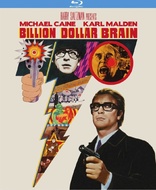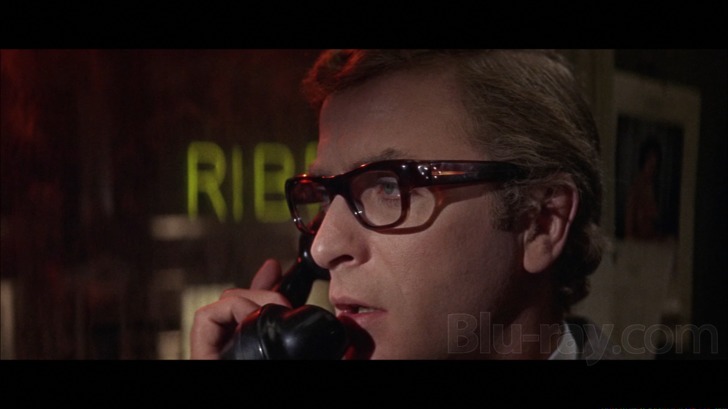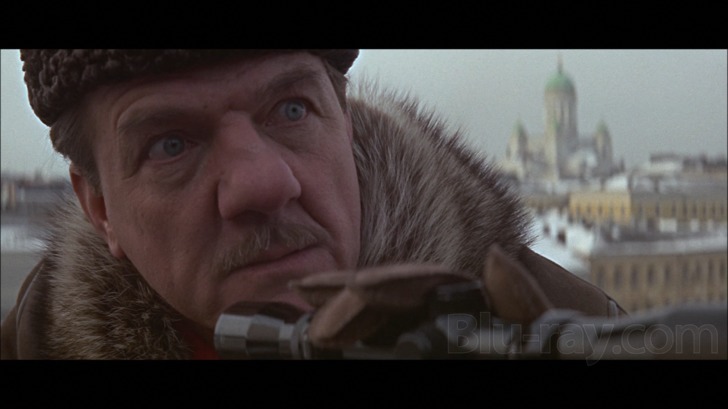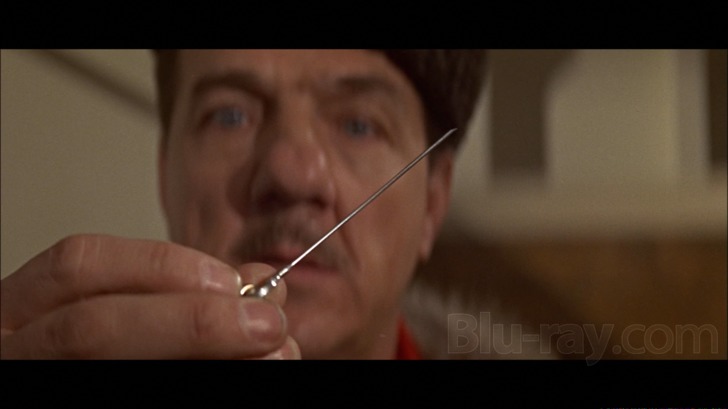Billion Dollar Brain Blu-ray Movie
HomeBillion Dollar Brain Blu-ray Movie 
Kino Lorber | 1967 | 111 min | Not rated | Oct 07, 2014
Movie rating
6.6 | / 10 |
Blu-ray rating
| Users | 0.0 | |
| Reviewer | 2.5 | |
| Overall | 2.5 |
Overview
Billion Dollar Brain (1967)
Antihero Harry Palmer having left the Secret Service, is now working as a private eye. He is soon sucked into a web of conspiracy involving a far-right American billionaire, General Midwinter, who plans to wipe out the Communist threat in Latvia using his highly sophisticated computer system.
Starring: Michael Caine, Karl Malden, Ed Begley, Oskar Homolka, Guy DolemanDirector: Ken Russell
| Drama | 100% |
| Adventure | Insignificant |
| Thriller | Insignificant |
Specifications
Video
Video codec: MPEG-4 AVC
Video resolution: 1080p
Aspect ratio: 2.34:1
Original aspect ratio: 2.35:1
Audio
English: DTS-HD Master Audio 2.0 (48kHz, 16-bit)
Subtitles
None
Discs
25GB Blu-ray Disc
Single disc (1 BD)
Packaging
Slipcover in original pressing
Playback
Region A (B, C untested)
Review
Rating summary
| Movie | 3.0 | |
| Video | 2.5 | |
| Audio | 3.5 | |
| Extras | 0.5 | |
| Overall | 2.5 |
Billion Dollar Brain Blu-ray Movie Review
What's the rate of inflation again?
Reviewed by Jeffrey Kauffman October 20, 2014There are just a few too many zeroes in the opening credits sequence of Billion Dollar Brain, where the number is displayed with twice as many zeroes as it should have. Maybe that was just wishful thinking on the part of producer Harry Saltzman, a man who had already raked in untold millions as one of the co-producers of the James Bond films, and who had also added at least incrementally to his bank account with two other spy films featuring Len Deighton’s anti-hero Harry Palmer, 1965’s The Ipcress File and 1966’s Funeral in Berlin. The third and final Palmer film produced by Saltzman was 1967’s Billion Dollar Brain, a somewhat prescient piece detailing an all seeing, all knowing supercomputer (think NSA, only with patch cords, reel to reel tapes and punch cards) and the threat of bioterrorism. The three original Palmer films (two late comers with Caine, not based on Deighton novels, followed decades later) were obviously tooled to be kind of the flip side of what was then the Bond craze. Palmer was a bit more proletarian than the patrician Bond, a kind of working class grunt who just happened to be a secret agent. While he may not have had Bond’s panache and savoir faire, the Palmer films still indulge in genre tropes like Palmer being able to seemingly instantly seduce a gorgeous woman (in Billion Dollar Brain’s case, the delectable Françoise Dorléac) simply by looking at her, but in other ways the Palmer films are at least relatively more real feeling.

Palmer is actually out of the spy business as Billion Dollar Brain opens, having evidently set up shop as an apparently none too successful private eye. When he returns to his somewhat squalid flat one evening, he’s surprised to find his former MI-5 boss Colonel Ross (Guy Doleman) waiting for him, replete with a new job offer in hand. Palmer is nonplussed and demurs, but soon events overtake the erstwhile spy. A mysterious call from a mechanical sounding voice gives Palmer instructions for a job which might include a handsome paycheck.
That in turn leads Palmer to Helsinki, carrying a Thermos bottle of what Palmer divines are eggs of some sort. Palmer is met by a luscious woman named Anya (Dorleac, in her last film appearance before her tragic death), who in turn delivers Palmer to an old cohort of his named Leo Newbigen (Karl Malden). Anya has already submitted to a kiss from Palmer, so when it turns out she’s Newbigen’s supposed main squeeze, Palmer is (perhaps appropriately, given the Finnish location) left out in the cold.
Luckily (or at the very least conveniently), Palmer becomes the spy who came in from that particular cold when Ross shows up again and informs him he is now going to spy on Leo, whether he wants to or not. Leo meanwhile has revealed the source of the mechanical voice that instigated this whole escapade—it’s a giant “super computer” that Leo receives daily instructions from. The Thermos encased eggs have a viral agent that is supposedly going to be used in some upcoming conflagration that will supposedly precipitate the fall of the Soviet Union.
As with both The Ipcress File and Funeral in Berlin, Billion Dollar Brain is a perhaps overly densely plotted thriller, one which involves a number of betrayals, back stabbings and shifting alliances, while also working in one of the great staples of sixties’ conspiracy minded political films, the right wing ideologue (in this case a General played by the great Ed Begley). The film is notable for some colorful supporting performances, including Oskar Homolka as a Russian colonel who’s an old acquaintance of Palmer’s.
But perhaps the most anachronistic thing about Billion Dollar Brain is its director: Ken Russell. Yes, that Ken Russell, of Women in Love and Tommy (among countless others) fame. Here probably “slumming” (at least relatively speaking) to pick up a paycheck, Russell toys with various perspectives, keeping the viewer slightly akimbo. Pay attention, for example, to the initially confusing jump cut after Newbigen fires a high powered rifle from atop a Helsinki roof—the clear indication is that a major character has “caught” the bullet, but it’s simply cinematic sleight of hand.
Billion Dollar Brain will probably play a bit too quaint, or even old hat, for contemporary cynics. It doesn’t have the bleak underpinnings of The Ipcress File, though Caine continues to make Palmer a rather engaging anti-hero. The film also can’t quite escape from the looming cloud that appears whenever Dorleac is on the screen. This ravishing woman, who co-starred with her older sister Catherine Deneuve in Jacques Demy’s lovely The Young Girls of Rochefort just before shooting Billion Dollar Brain, died in a horrifying car accident shortly after wrapping the Russell film.
Billion Dollar Brain Blu-ray Movie, Video Quality 

Billion Dollar Brain is presented on Blu-ray courtesy of Kino Lorber Studio Classics with an AVC encoded 1080p transfer in 2.34:1. This has the look of an older master, perhaps even a much older master that may have been prepared during the DVD or early HD broadcast era. The presentation here is rife with artificial sharpening, with regular (albeit admittedly relatively minor) haloing showing up which can be spotted in several of the screenshots accompanying this review. Ironically, despite these efforts most of the presentation looks very soft, with some shots appearing almost fuzzy (see screenshot 10). Colors have faded and are somewhat anemic looking. Detail is generally decent but can occasionally rise incrementally in some close-ups (see screenshot 3). Grain resolution is a bit haphazard at times (something else that may indicate an older master), with some sequences looking nicely organic but others suffering from occasional clumping.
Billion Dollar Brain Blu-ray Movie, Audio Quality 

Billion Dollar Brain features a workmanlike lossless DTS-HD Master Audio 2.0 mono mix that proffers clear, clean dialogue, along with good support for Richard Rodney Bennett's moody score. (Perhaps to subliminally cement the Palmer films with the Bond outings, Saltzman had ported over Bond composer John Barry for The Ipcress File, but did not retain him for the subsequent films.) Fidelity is very good throughout this presentation, with no major damage or issues of any kind to cause concern.
Billion Dollar Brain Blu-ray Movie, Special Features and Extras 

- Trailer (1080i; 2:45)
Billion Dollar Brain Blu-ray Movie, Overall Score and Recommendation 

Billion Dollar Brain may ultimately be too outlandish for its own good. In fact the oversized computer and cartoonish villains seem more at place in the world of producer Saltzman's other iconic spy, James Bond, than they do in the supposedly more realistic milieu of Harry Palmer. The film is quite scenic and benefits from good performances, but Russell seems to be at odds with the material here, creating a disconnect between the story and its presentation. Video quality is fairly ragged, though for fans of the film who don't mind some anomalies, it's watchable.
Similar titles
Similar titles you might also like

The Spy Who Came in from the Cold
1965

The Ipcress File
1965

Child 44
2014

Man on a String
Ten Years a Counterspy
1960

Funeral in Berlin
1966

Smiley's People
1982

Hell and High Water
Limited Edition to 3000
1954

Fail Safe
1964

The Club
El Club
2015

Sunflower
I girasoli
1970

Carlos
2010

Farewell
L'affaire Farewell
2009

Barbara
2012

Topaz 4K
1969

The Confession
L'aveu
1970

The Ugly American
1963

Strike
Стачка | Stachka | Remastered Edition
1925

Pioneer
Pionér
2013

Scorpio
1973

The Manchurian Candidate 4K
1962